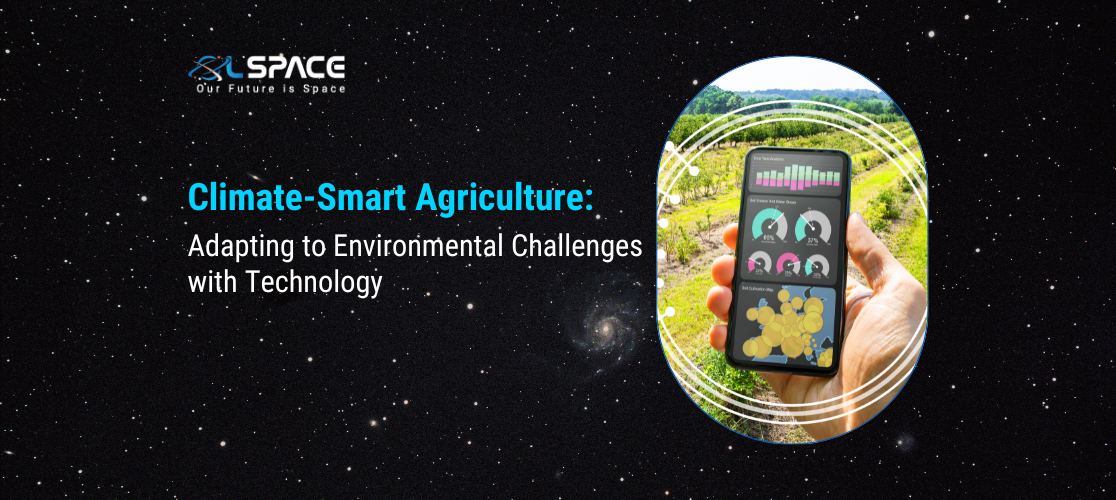01 March 2024
Climate-Smart Agriculture: Adapting to Environmental Challenges with Technology

Climate change poses significant challenges to agricultural systems worldwide, impacting crop yields, water availability, and soil health. In response, farmers and agricultural stakeholders are increasingly turning to technology-driven solutions to mitigate the effects of climate change and build resilience in their farming practices. Climate-smart agriculture (CSA) integrates innovative technologies to optimise resource use, minimise environmental impact, and enhance agricultural productivity in a changing climate. This article explores how technology is transforming agriculture to adapt to environmental challenges and promote sustainability.
Precision Agriculture and Remote Sensing:
Precision agriculture technologies, such as GPS-guided tractors, drones, and satellite imagery, enable farmers to monitor crops and soil conditions with unprecedented precision. Remote sensing data provides real-time insights into crop health, moisture levels, and nutrient deficiencies, allowing farmers to make data-driven decisions and optimise resource allocation.
Smart Irrigation Systems:
Smart irrigation systems leverage sensor technologies and data analytics to optimise water use in agriculture. Soil moisture sensors, weather forecasts, and evapotranspiration models enable farmers to schedule irrigation based on crop water requirements and environmental conditions, reducing water waste and improving water efficiency.
Climate-Resilient Crop Varieties:
Advances in breeding techniques and biotechnology have led to the development of climate-resilient crop varieties that are better adapted to environmental stresses such as heat, drought, and pests. These genetically modified crops can withstand extreme weather conditions and produce higher yields with fewer inputs, helping farmers adapt to changing climate patterns.
Conservation Agriculture Practices:
Conservation agriculture practices, such as no-till farming, cover cropping, and crop rotation, promote soil health and resilience while reducing greenhouse gas emissions and erosion. These practices improve soil structure, water retention, and nutrient cycling, enabling farmers to maintain productivity in the face of climate variability.
Data Analytics and Predictive Modeling:
Data analytics and predictive modeling tools analyse large datasets to identify trends, patterns, and correlations that can inform climate-smart agricultural practices. Machine learning algorithms can predict crop yields, pest outbreaks, and weather patterns, enabling farmers to anticipate risks and implement adaptive management strategies.
Blockchain for Supply Chain Transparency:
Blockchain technology enhances transparency and traceability in the agricultural supply chain, allowing consumers to track the origin and journey of agricultural products from farm to fork. By providing immutable records of transactions and production practices, blockchain improves trust and accountability in the food system while incentivising sustainable farming practices.
Climate-Smart Livestock Management:
Climate-smart livestock management practices, such as rotational grasing, feed optimisation, and genetic selection, reduce the environmental footprint of livestock production while improving animal welfare and productivity. Technologies such as wearable sensors and precision feeding systems enable farmers to monitor animal health and behavior in real-time, optimising feed efficiency and resource use.
Agroforestry and Carbon Sequestration:
Agroforestry systems integrate trees and shrubs into agricultural landscapes to provide multiple benefits, including soil conservation, biodiversity conservation, and carbon sequestration. By incorporating trees into their farms, farmers can enhance ecosystem resilience, mitigate climate change, and diversify their income streams through timber, fruit, and nut production.
Mobile Apps and Extension Services:
Mobile apps and extension services deliver agronomic advice, weather forecasts, market prices, and pest alerts directly to farmers’ smartphones, empowering them to make informed decisions in real-time. These digital platforms facilitate knowledge exchange, capacity building, and peer-to-peer learning, enabling farmers to adopt climate-smart practices more effectively.
Policy Support and Financing Mechanisms:
Government policies and financing mechanisms play a crucial role in incentivizing and supporting climate-smart agriculture initiatives. Subsidies for sustainable farming practices, carbon credits for emissions reductions, and climate risk insurance schemes help farmers invest in technologies and practices that build resilience and mitigate climate-related risks.
Conclusion:
Climate-smart agriculture represents a paradigm shift in farming practices, leveraging technology to adapt to environmental challenges and promote sustainability. By embracing precision agriculture, smart irrigation, climate-resilient crops, and data-driven decision-making, farmers can enhance productivity, conserve natural resources, and mitigate the impacts of climate change on food security and livelihoods. As technology continues to evolve and become more accessible, climate-smart agriculture holds immense promise for building a more resilient and sustainable food system that can withstand the challenges of a changing climate.
